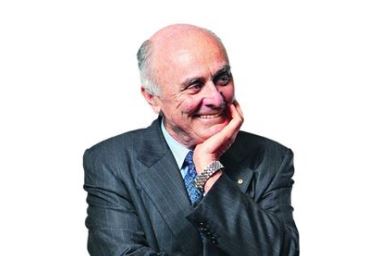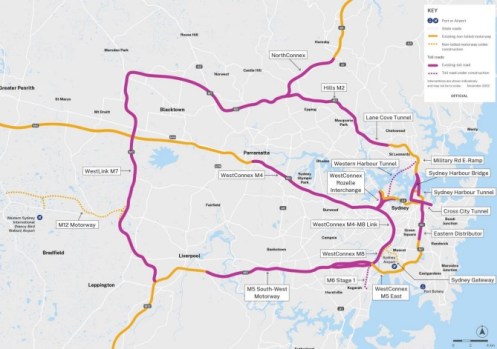The NSW government should take back control of Sydney’s tolled rolls via a new state owned entity that will drive major reform and ensure better regulation, according to an independent review.

However, the review also warns about the government being ‘held hostage’ by toll operators, saying there’s a need for swift legislation to get its reform agenda through.
The final report of former ACCC chair Allan Fels and former Chair of the Prices Surveillance Authority and Victorian Consumer Affairs director David Cousins was handed down on Tuesday after a 15 month investigation into the toll road ‘patchwork’.
“Reviewers are not confident that a voluntary agreement could be reached in a timely manner and in the public interest,” Professor Fels and Dr Counsins say.
“Immediate legislation is needed as a back up to negotiations and to
give the government power if necessary to determine final outcomes.”
Weaknesses in PPPs
The review identified weaknesses in the way tolls are set under Public Private Partnership arrangements, including a lack of transparency about how they are determined and whether the levels at which they are set are appropriate.
It calls for a major overhaul of the network of tolled roads, with uniform tolls across the state’s 13 motorways and a reduction in costs to motorists funded in part by a two way toll on Harbour crossings.
“Legislation will be needed as soon as possible to enable the establishment of (the new body) NSW Motorways and to give the government power to make timely and final decisions on tolls, and provide for a revenue adjustment mechanism,” it says.
The report recommends bringing in changes in tolls by mid 2026, with tolling infrastructure to be upgraded and systems developed to allow motorists to receive one bill per trip.
Cash relief not working
The report says costly toll relief and cashback schemes should be phased out over time and the money instead used to subsidise toll reductions.
“Current toll relief schemes are inadequately targeted and underutilised, in part due to overly complex administration,” the reviewers say.
Final recommendations include:
- Uniform tolls for all 13 motorways and two under construction
- Reduced tolls for most trips
- The establishment of a new state owned entity to give control of tolls back to the government and set prices
- IPART to oversee toll setting approaches
- Tolls to decline as distance increases
- Introduce an infrastructure charge
- Introduce two-way tolling on the Harbour Bridge and Tunnel, and Eastern Distributor with revenue used to lower tolls on other parts of the network
- A customer advocate to represent motorists and handle complaints
Australia’s most tolled city
NSW Treasurer Daneil Mookhey says the report shows that toll road privatisation has created complexity, inefficiency and unfairness.
“The report highlights Sydney’s toll road network is a poorly-functioning patchwork of numerous different price structures that will cost motorists $195 billion in nominal terms in tolls over the next three and a half decades on top of the billions they have already paid,” he said.

Sydney has more toll roads than any other capital city in Australia, with toll roads making up nearly one-half of the city’s motorway network.
There currently 10 private motorway concessions in operation, with road toll company Transurban the dominant player. Three of the motorways are part of the WestConnex project.
Ensuring public interest
Toll operators have indicated they want to co-operate with the government in delivering reform, the reviewers say, however this doesn’t extend to the report’s recommended network approach or declining distance charges.
The reviewers say operators have indicated in-principle agreement that new tolling systems could be reached by the end of 2024, followed by individual re-negotiation of contracts, compensation if necessary, and introduction of new tolling arrangements by late 2025.
“We are not confident that such an approach would yield an outcome in the public interest,” the reviewers say.
Under this process, the government itself would be held hostage to the agreement of all the concessionaires and investors involved.
Final Report of the Independent Toll Review, Professor Allan Fels and David Cousins
“Rather there is a danger that this would put the interests of concessionaires first. Under this process, the government itself would be held hostage to the agreement of all the concessionaires and investors involved.
“We consider that an attempt to adopt this process should occur, but the government should in the meantime legislate to enable it, if necessary, to reach timely and final decisions that would achieve reforms in the public interest.”
Mr Mookey says he will consider the report and respond in due course, but stressed the government is committed to toll relief and reform.
“Today’s report is the next important step in reforming an unnecessarily complex and costly system,” he said.





My 2 bobs worth are as follows we the vehicle owners pay to have our cars road worthy, but most of the roads are not car worthy at all.
The fact that roads and highways are tolls is a blight on our governments and the spin off corporations that have a licence to print money.
All roads etc should be toll FREE.
As My friends do not see an improvement at all with the blame always shifted from post to post.
Just saying
Chris